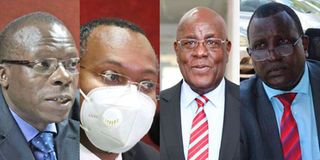Premium
Uhuru: I will not appoint six rejected judges

From left: Justices George Odunga, Joel Ngugi, Weldon Korir and Aggrey Muchelule.
President Uhuru Kenyatta has no intention to appoint the six judges as ordered by the High Court last week, his court papers indicate.
Mr Kenyatta says the judgment, if implemented, is likely to put his office and that of Chief Justice Martha Koome at a conflict.
As a result, the President wants the Court of Appeal to suspend implementation of the order pending determination of his appeal in which he is arguing that the High Court judgement is unconstitutional.
In the four-page draft memorandum of appeal filed Wednesday, Mr Kenyatta says the orders issued by three-judge bench comprising of Justices George Dulu, James Wakiaga and William Musyoka, are based on foreign precedents.
He says the judgment has the potential effect of creating a conflict between the office of the Chief Justice and the Office of the President.
“The judgment is clearly an attempt to rewrite or otherwise amend the Constitution in a manner not contemplated under Chapter 16 of the Constitution,” says the President through lawyer Waweru Gatonye.
He says the judges made legal blunders by ordering the President to appoint the six nominees within 14 days failure to they will be deemed as duly appointed.
The judges also said that upon lapse of the 14 days, CJ Koome and the Judicial Service Commission (JSC) will be at liberty to facilitate the swearing in of the six judicial officers.
But in an attack to the 69-page judgment, Mr Gatonye says the judges erred in law and fact by relying on foreign precedents to arrive at a conclusion that the powers of the President to appoint judges lapsed after 14 days after receiving names from the JSC.
“There is no express provision in the Constitution or the JSC Act for such times except in the case of appointment of the Chief Justice and Deputy Chief Justice,” says Mr Gatonye.
In addition, he argues that the judges made orders that are against wording and provisions of Article 166(1) of the Constitution.
Article 166(1) provides that “The President shall appoint: (a) the Chief Justice and the Deputy Chief Justice, in accordance with the recommendation of the Judicial Service Commission, and subject to the approval of the National Assembly; and (b) all other judges, in accordance with the recommendation of the Judicial Service Commission.”
The judges, Mr Gatonye argues, also failed to appreciate the importance of separation of powers and judicial deference to decisions and powers that lie with the political arms of the government.
He is also against the court’s order to direct the Presidency to foot the costs of the case which was filed last year by Constitutionalism advocacy group Katiba Institute.
The case was a public interest litigation with no private interest accruing to the petitioners, argues Mr Gatonye a senior counsel.
The lawyer further states that the court was wrong in finding that Mr Kenyatta ought to be sued through the Attorney General yet they went ahead to hold that his participation in the case was not fatal.
“The judges erred by making a contradictory finding that whereas there was a misjoinder of the President in the case, his presence did not prejudice him yet there were clearly adverse orders sought against him by the petitioners,” says the lawyer.
The President wants the appellate court to certify as urgent his application for suspension of implementation of the judgment pending the hearing and determination of his intended appeal.
He says he has an arguable appeal with good prospects of success and that unless his application for stay is allowed, his appeal will be rendered nugatory because the six judges will be deemed to have been duly appointed as ordered by the High Court.
“There is an imminent danger of embarrassment and uncertainty in the dispensation of justice for if the six nominees are deemed appointed as judges, and they proceed to preside over legal proceedings notwithstanding the pendency of the intended appeal, and which can reverse the deemed appointments,” argues lawyer Gatonye in the stay application.





